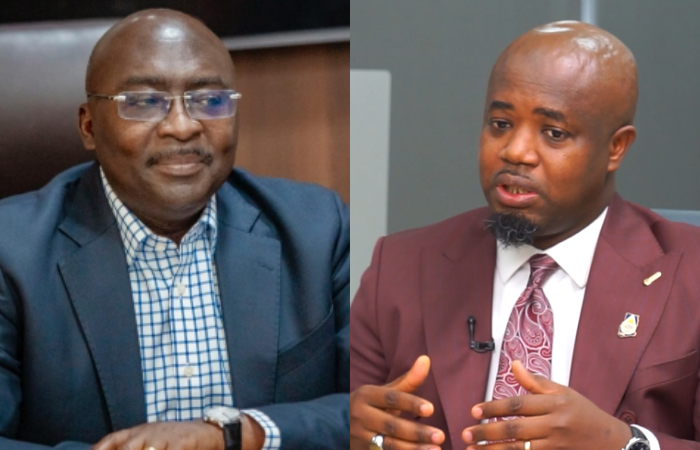Godwin Edudzi Tamekloe, the Director of Legal Affairs for the National Democratic Congress (NDC), has launched a scathing critique of former Vice President Dr. Mahamudu Bawumia’s recent assertions regarding his leadership capabilities and innovative ideas. Tamekloe argues that Bawumia’s claims ring hollow given the current economic predicament faced by Ghana, a situation he attributes, in large part, to Bawumia’s own economic stewardship. The former Vice President, during a meeting with over 200 former Metropolitan, Municipal, and District Chief Executives (MMDCEs), emphasized his intellectual wealth and capacity to transform Ghana, positioning himself as a potential leader for the future. However, Tamekloe dismisses these pronouncements as mere rhetoric, detached from the economic hardships experienced by ordinary Ghanaians during Bawumia’s tenure as head of the Economic Management Team.
Tamekloe’s central argument revolves around the perceived disconnect between Bawumia’s self-proclaimed “rich ideas” and the tangible economic realities on the ground. He points to the significant depreciation of the Ghanaian cedi against the US dollar, reaching a low of GHS17 to the dollar, as a stark indicator of the failure of Bawumia’s economic policies. This sharp decline in the cedi’s value, Tamekloe contends, directly contradicts Bawumia’s claims of possessing transformative economic strategies. Furthermore, Tamekloe highlights the recent electoral defeat of the New Patriotic Party (NPP) in the 2024 elections, a loss he directly links to Bawumia’s leadership within the party. He argues that this electoral setback should serve as a humbling experience for the former Vice President and a reason to reconsider his political ambitions.
The timing of Bawumia’s pronouncements, coming just months after a significant electoral defeat, further fuels Tamekloe’s criticism. He suggests that Bawumia’s eagerness to re-enter the political arena demonstrates a lack of sensitivity to the economic hardships still impacting many Ghanaians. Tamekloe’s remarks reflect a broader sentiment within the NDC, viewing Bawumia’s renewed political aspirations as premature and out of touch with the prevailing economic climate. The sharp exchange between Tamekloe and Bawumia underscores the intensifying political climate in Ghana as key figures within the NPP begin to position themselves for leadership roles in the post-Akufo-Addo era.
Tamekloe’s critique of Bawumia’s economic leadership extends beyond the depreciation of the cedi. He implicitly questions the efficacy of the economic policies implemented during Bawumia’s tenure, suggesting that they contributed to the current economic woes facing the nation. By emphasizing the disconnect between Bawumia’s rhetoric and the lived experiences of Ghanaians, Tamekloe attempts to portray the former Vice President as being detached from the realities faced by ordinary citizens. This portrayal seeks to undermine Bawumia’s credibility as a potential future leader and to cast doubt on his ability to deliver on his promises of economic transformation.
The public clash between Tamekloe and Bawumia also highlights the broader political dynamics at play within Ghana. The NPP’s defeat in the 2024 elections has created a vacuum within the party, leading to a scramble for leadership positions. Bawumia’s attempt to position himself as a frontrunner for the NPP’s flagbearership in the 2028 elections has evidently drawn criticism not only from opposition parties but also potentially from within his own party. Tamekloe’s remarks can be interpreted as a strategic move by the NDC to capitalize on the internal divisions within the NPP and to further discredit Bawumia’s economic credentials.
In essence, Tamekloe’s criticism of Bawumia revolves around the argument that the former Vice President’s claims of possessing transformative economic ideas are contradicted by the economic realities experienced by Ghanaians during his time in office. The sharp depreciation of the cedi, coupled with the NPP’s recent electoral defeat, serves as the primary evidence for Tamekloe’s assertion that Bawumia’s economic leadership has been ineffective. This public critique not only highlights the ongoing political tensions between the NDC and NPP but also underscores the internal jostling for power within the NPP as the party seeks to rebuild after its electoral setback. The exchange between Tamekloe and Bawumia sets the stage for what is likely to be a contentious political landscape in the lead-up to the 2028 elections.


